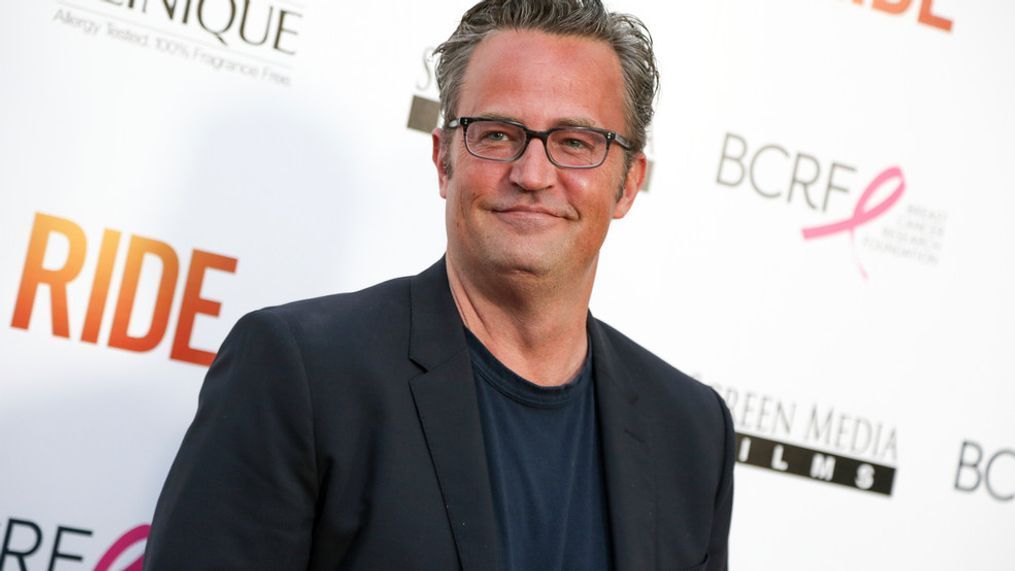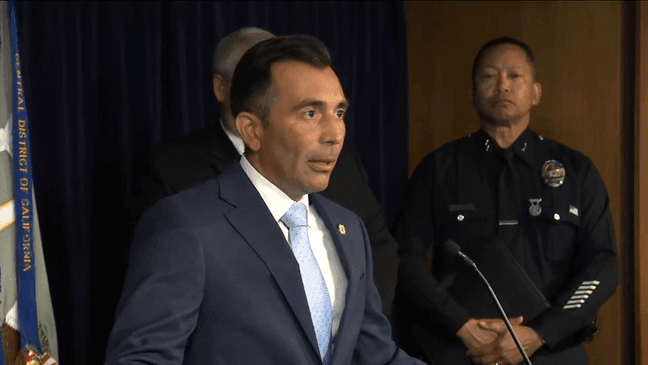Doctors, dealers including 'Ketamine Queen' named in Matthew Perry's tragic death scandal
LOS ANGELES (TND) — Authorities said five people were arrested in connection to a ketamine overdose that claimed the life of actor Matthew Perry.
The five defendants arrested in, including two medical doctors, were part of awide-ranging investigation conducted by federal and local law enforcement agencies.
The investigation revealed a broad underground criminal network responsible for distributing large quantities of ketamine to Perry and others, according to Martin Estrada the United States Attorney for the Central District of California.
Authorities provided their findings on Thursday during a news conference in Los Angeles detailing the arrests and charges in the case.
The "Friends" actor was found dead in a pool at his Los Angeles home on October 28, 2023.
The suspects are facing charges of conspiracy to distribute ketamine and distribution of ketamine resulting in death,maintaining a drug-involved premises and and altering and falsifying records related to a federal investigation. Prosectors also noted the suspects also face drug-trafficking counts.
DoctorsSalvador Plasencia and Mark Chavez, Kenneth Iwamasa, Perry's live-in assistant, Erik Fleming, an alleged drug dealer who worked for Jasveen Sangha also known as the "Ketamine Queen of Los Angeles" were part of the network uncovered.
Iwamasa is accused of injecting the actor with the drug on the day he died, according toEstrada. The syringe that was used during the deadly injection was provided by Plasencia.
These defendants were more interested in profiting off Mr. Perry than caring for his well being," said Estrada.
Ketamine, a controlled substance found in the actor's body, was not legally prescribed.
An autopsy in December showed that the 54-year-old star died from acute effects of ketamine, according to the Los Angeles County Department of Medical Examiner.
Other contributing factors in Perry's death were drowning, coronary artery disease and the effects of buprenorphine, which is used to treat opioid use disorder.
Authorities noted evidence revealed that Perry, who was a known addict that had sought out treatment, had fallen back into addiction last Fall.
DEA administrator Anne Milgram told reporters that the celebrity had sought treatment for depression and anxiety, which investigators believe led to his addiction to intravenous ketamine.
"When clinic doctors refused to increase his dosage, he turned to unscrupulous doctors who saw Perry as a way to make quick money. Dr. Plasencia and Dr. Chavez violated the oath they took to care for their patients," saidMilgram. "Instead of do no harm, they did harm so that they could make more money."
Ketamine has some legitimate uses, but it is also used illegally. "It is used by people seeking to disassociate from reality," explained Estrada.
Officials said it can cause serious health effects, serious health problems, including loss of consciousness, including spikes in blood pressure and including respiratory issues that can deprive the brain of oxygen.
Plasencia and Sangha, who were identified as the lead defendants in the case, worked with Chavez to obtain ketamine. Chavez is accused of working with Perry's live-in assistant,Iwamasa, to distribute ketamine to Perry over two months.
Approximately 20 vials of ketamine were sold to Perry for $55,000 from September to October.
Estrada alleged that Plasencia saw an "opportunity to profit off of Perry."
Investigator revealed a vial ofketamine that costs a doctor $12 was sold to Perry for $2,000.
A text message sent in September fromPlasencia stated, "I wonder how much this moron will pay."
Evidence showed thatPlasencia wanted to be Perry's drug provider, "I want to be his go to for drugs as a doctor."
"They [defendants] knew what they were doing was wrong. They knew what they were doing was risking great danger to Mr. Perry, but they did it anyways. In the end, these defendants were more interested in profiting off Mr. Perry than caring for his well being," said Estrada.
The suspects are also accused of trying to cover up Perry's death.
"On October 28th, after reading news reports of Mr. Perry's death, defendant Sangha wrote a text message to defendant Fleming, saying 'delete all of our messages,'" said the prosector. "Likewise, after Mr. Perry's death, defendant Plasencia falsified medical records and notes to try to make it look like what he was doing was legitimate. It was not."
If convicted,Plasencia is facing 120 years in federal prison, whileSangha could serve a life sentence.
Prosectors delivered a message to drug dealers during the news conference.
"If you are in the business of selling dangerous drugs, we will hold you accountable for the deaths that you cause," said Estrada. "You are playing roulette with other people's lives."
The family of “Dateline” correspondent Keith Morrison, who is Perry’s stepfather, said in a statement to NBC News that they welcomed the charges.
We were and still are heartbroken by Matthew’s death, but it has helped to know law enforcement has taken his case very seriously,” the family said. "We look forward to justice taking its course.
Perrychronicled his struggles with addiction in his 2022 memoir, “Friends, Lovers and the Big Terrible Thing.”




